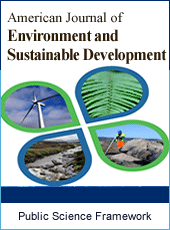American Journal of Environment and Sustainable Development
Articles Information
American Journal of Environment and Sustainable Development, Vol.5, No.4, Dec. 2020, Pub. Date: Dec. 11, 2020
Impact of Climate Variability on Community Livelihoods in Rwanda
Pages: 72-82 Views: 2620 Downloads: 593
[01]
Pascal Tuyishime, Faculty of Environmental Studies, University of Lay Adventists of Kigali, Kigali, Rwanda.
[02]
Lamek Nahayo, Faculty of Environmental Studies, University of Lay Adventists of Kigali, Kigali, Rwanda.
[03]
Philbert Mugisha, Faculty of Environmental Studies, University of Lay Adventists of Kigali, Kigali, Rwanda.
[04]
Jean Damascene Rutagengwa, Faculty of Environmental Studies, University of Lay Adventists of Kigali, Kigali, Rwanda.
[05]
Anastase Gahutu Mbabarira, Faculty of Environmental Studies, University of Lay Adventists of Kigali, Kigali, Rwanda.
The variability of climate mainly rainfall and temperature has over last decades contributed to significant losses among community livelihoods and the poorer are the largely affected. This study aimed to analyze the impact of climate variability on community livelihoods in Gicumbi district, Northern Rwanda. The authors employed secondary data on rainfall and temperature and on community livelihoods which ranged from 2013 to 2019. The Geographic Information System (GIS) was used to map factors of climate variability. The Statistical Package for Social Sciences (SPSS) through its Pearson correlation test indicated the extent to which climate variability impacts on community livelihoods. The results indicated that years of 2013 and 2017 recorded high annual mean rainfall (119.345 and 90.05 mm) and years of 2014 and 2015 registered high annual mean temperature of 24.2 and 24.6 degree Celsius, respectively. This led to landslide, flood, rainstorms, windstorms, lightning and hailstorms occurrence which killed/injured people, damaged houses and cropland, led to livestock loss and destruction of infrastructures. The year 2017 registered a high number of community livelihoods losses (885.7 cases). The correlation analysis indicated that both temperature and rainfall variability has negatively impacted on people’s livelihoods. This was confirmed by a p-value of 0.015171 and -0.071904 for rainfall and temperature variability with livelihood loss, respectively. These values were smaller than 0.05 and confirmed a statistically significant association between climate variability and loss on community livelihoods. The findings of this study can enable policy makers to better understand how changes on rainfall and temperature impact on livelihoods, and the strategic measures which can be adopted to adapt to climate variability.
Climate Variability, Gicumbi District, Livelihoods, Rainfall, Temperature, Rwanda
[01]
Shackleton, S. E. and C. M. Shackleton, Linking poverty, HIV/AIDS and climate change to human and ecosystem vulnerability in southern Africa: consequences for livelihoods and sustainable ecosystem management. International Journal of Sustainable Development & World Ecology, 2012. 19 (3): p. 275-286.
[02]
Nikulin, G., et al., The effects of 1.5 and 2 degrees of global warming on Africa in the CORDEX ensemble. Environmental Research Letters, 2018. 13 (6): p. 065003.
[03]
Shongwe, M. E., et al., Projected changes in mean and extreme precipitation in Africa under global warming. Part II: East Africa. Journal of climate, 2011. 24 (14): p. 3718-3733.
[04]
IPCC, C. C., Mitigation of climate change. Contribution of Working Group III to the Fifth Assessment Report of the Intergovernmental Panel on Climate Change, 2014.
[05]
Ullah, W., et al., Understanding climate change vulnerability, adaptation and risk perceptions at household level in Khyber Pakhtunkhwa, Pakistan. International Journal of Climate Change Strategies and Management, 2018. 10 (3): p. 359-378.
[06]
Sowers, J., A. Vengosh, and E. Weinthal, Climate change, water resources, and the politics of adaptation in the Middle East and North Africa. Climatic Change, 2011. 104 (3-4): p. 599-627.
[07]
Chaudhury, M., et al., Participatory scenarios as a tool to link science and policy on food security under climate change in East Africa. Regional Environmental Change, 2013. 13 (2): p. 389-398.
[08]
MIDIMAR, The Monthly and Annual Data on Disasters Countrywide. The Ministry of Disaster Management and Refugee Affairs (MIDIMAR). P. O. Box 4386 Kigali, Rwanda. Available at:http://midimar.gov.rw/index.php?id=65, accessed on 14th December, 2017. 2017.
[09]
Wagesho, N. and M. Claire, Analysis of Rainfall Intensity-Duration-Frequency Relationship for Rwanda. Journal of Water Resource and Protection, 2016. 8 (07): p. 706.
[10]
Rugigana, E., et al., Prioritization of disasters and their management in Rwanda. East African journal of public health, 2013. 10 (2): p. 429-439.
[11]
Habimana, A., et al., Community Health Workers’ knowledge, attitudes and practices about malaria prevention in Gicumbi District, Rwanda. Rwanda Journal, 2016. 3 (1): p. 27-35.
[12]
Bosco, N. J., M. Ildephonse, and N. Alexandre, Agriculture and Food Security in Gicumbi District, Northern Province of Rwanda. International Academic Journal of Social Sciences, 2018. 5 (1): p. 154-168.
[13]
Bizimana, H. and O. Sönmez, Landslide occurrences in the hilly areas of Rwanda, their causes and protection measures. Disaster Science and Engineering, 2015. 1 (1): p. 1-7.
[14]
Xiao, L., X. Li, and R. Wang, Integrating climate change adaptation and mitigation into sustainable development planning for Lijiang City. International Journal of Sustainable Development & World Ecology, 2011. 18 (6): p. 515-522.
[15]
Ndayisaba, F., et al., Inter-Annual Vegetation Changes in Response to Climate Variability in Rwanda. Journal of Environmental Protection, 2017. 8 (04): p. 464.
[16]
Ntawigenera, N. and C. Yadufashije, Environmental Protection as Disasters’ Risk Reduction Strategy in Rwanda: Knowledge, Attitudes and Practices of Community Members in Kamonyi District. International Journal of Research in Environmental Science (IJRES), 2019. 5 (3): p. 1-9.
[17]
Green, F., Mobilizing private finance: Unlocking the potential of Rwanda’s businesses to drive climate change adaptation. 2016.
[18]
Mikova, K., E. Makupa, and J. Kayumba, Effect of climate change on crop production in Rwanda. Earth Sci, 2015. 4 (3): p. 120-128.

ISSN Print: Pending
ISSN Online: Pending
Current Issue:
Vol. 6, Issue 4, December Submit a Manuscript Join Editorial Board Join Reviewer Team
ISSN Online: Pending
Current Issue:
Vol. 6, Issue 4, December Submit a Manuscript Join Editorial Board Join Reviewer Team
| About This Journal |
| All Issues |
| Open Access |
| Indexing |
| Payment Information |
| Author Guidelines |
| Review Process |
| Publication Ethics |
| Editorial Board |
| Peer Reviewers |


